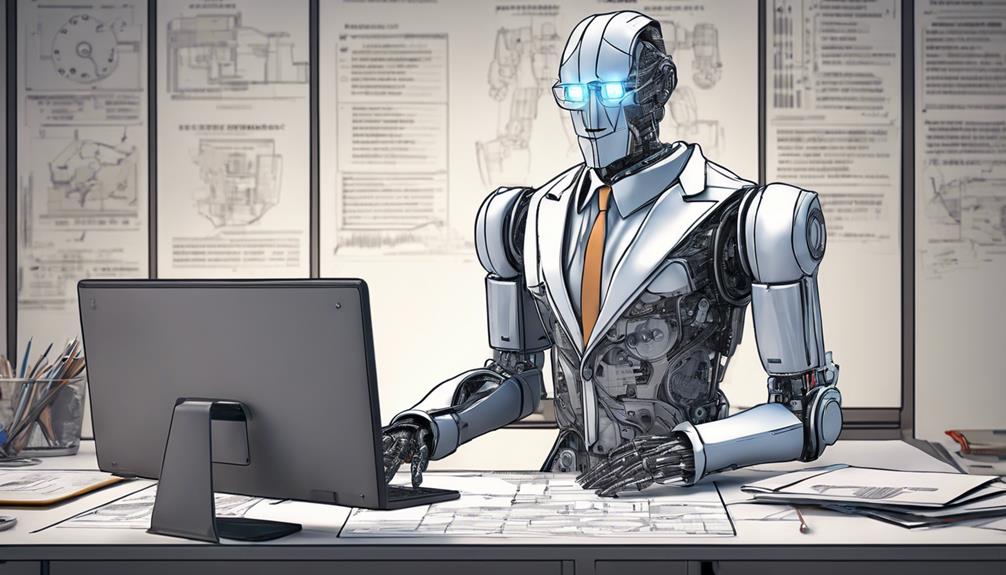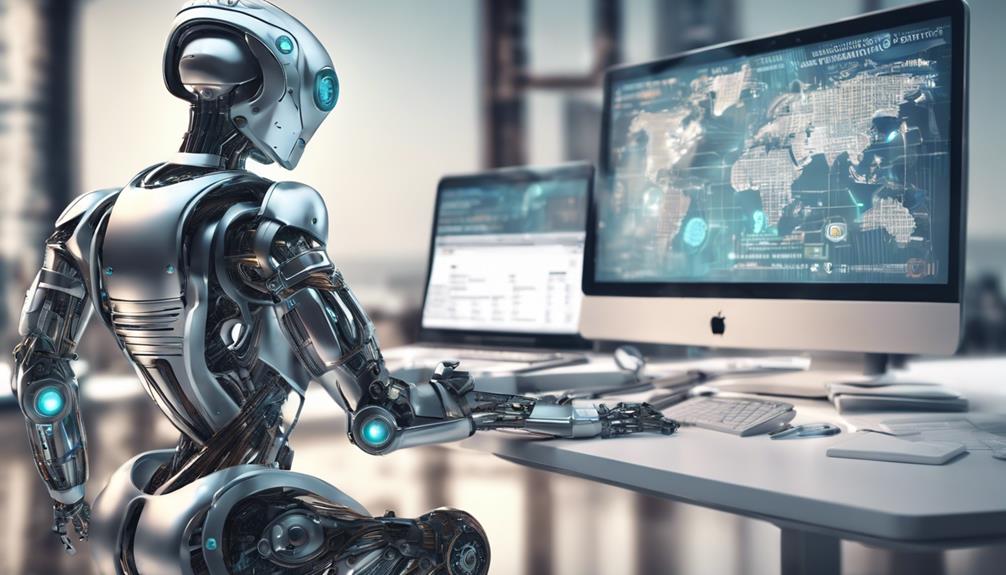In today’s rapidly evolving tech landscape, the question of which jobs can withstand the growing influence of artificial intelligence is a major focus. As we look towards the year 2024, certain professions still heavily depend on uniquely human qualities and skills.
These roles span across diverse sectors, from healthcare to creative endeavors, each demanding a specific set of skills that artificial intelligence struggles to replicate. The distinct blend of empathy, intuition, and creativity required in these professions sheds light on the irreplaceable essence of human involvement in crucial aspects of our society.
Key Takeaways
- Healthcare and counseling professions rely on human touch, empathy, and emotional support that AI cannot replicate.
- Creative professions like art and design thrive on human creativity, emotional connection, and originality beyond AI's capabilities.
- Legal and leadership positions demand human expertise in navigating complexities, ethical dilemmas, and emotional intelligence.
- Skilled trades and precision work require hands-on expertise, problem-solving skills, and human dexterity that AI lacks.
Healthcare Professions: Human Expertise
In the realm of healthcare professions, the indispensable nature of human expertise shines brightly in the realm of personalized care and clinical judgment. While AI can assist in diagnosis and monitoring, the human touch, empathy, and critical decisions made by healthcare professionals remain irreplaceable.
Beyond the realm of data analysis and pattern recognition, human healthcare professionals bring a unique blend of knowledge, empathy, and sensible hunches to the table.
Personalized care, a cornerstone of effective healthcare, thrives on the ability of healthcare professionals to tailor treatments and approaches to individual patients. This level of customization goes beyond what AI algorithms can achieve, as it requires a deep understanding of not only the medical condition but also the patient's unique circumstances and preferences.
Additionally, clinical judgment, especially in high-stress situations, relies on the experience, intuition, and empathy of human professionals to make split-second decisions that can impact patient outcomes significantly. The human element in healthcare is what ensures that patients receive not just treatment, but holistic care that addresses their physical, emotional, and psychological needs.
Education: Human Connection and Guidance

With a profound emphasis on human connection and guidance, the field of education stands as a beacon of personalized learning experiences and holistic student development.
Teachers play a crucial role in providing tailored learning experiences that cater to the diverse needs of each student, fostering critical thinking, creativity, and a deep passion for learning. Beyond academics, human educators offer essential social and emotional guidance, nurturing empathy and understanding in students. They recognize the importance of addressing diverse student needs, ensuring that every individual feels supported and valued.
Moreover, teachers contribute significantly to character shaping, instilling values and morals that extend far beyond the classroom. This human touch in education cannot be replaced by AI, as it involves intricate interactions and the ability to connect with students on a personal level.
The impact of educators in shaping young minds and preparing them for the future is irreplaceable, highlighting the indispensable nature of human presence in the field of education.
Legal Professionals: Judgment and Advocacy
Considering the intricate nature of legal proceedings and the indispensable role of human judgment and advocacy, the realm of legal professionals stands as a cornerstone of ensuring justice and upholding ethical standards.
Legal professionals rely on a combination of judgment, interpretation, and contextual understanding to navigate the complexities of the law. Advocacy in the legal field goes beyond mere representation; it involves strategic thinking, emotional intelligence, and a deep consideration of ethical implications, aspects that AI currently cannot replicate.
The nuances of law and legal proceedings demand human expertise and experience, elements that artificial intelligence lacks. Human lawyers play a pivotal role in representing clients, negotiating settlements, and ensuring that justice is served.
Moreover, ethical dilemmas and moral reasoning inherent in legal matters require the nuanced touch of human lawyers to navigate through these complexities and arrive at fair and just outcomes. In a world filled with ethical considerations and intricate legal dilemmas, the human touch in the legal profession remains irreplaceable.
Mental Health and Counseling: Emotional Support

The ability to provide emotional guidance techniques and establish a human connection is paramount in the field of mental health counseling. AI lacks the capacity to offer the nuanced empathy and personalized care that human counselors deliver.
Building trust and rapport with clients are foundational elements that highlight the irreplaceable role of human counselors in providing essential emotional support.
Emotional Guidance Techniques
Amidst the advancements in technology, the irreplaceable essence of emotional guidance techniques within mental health and counseling lies in the unparalleled depth of human connection and empathy they offer to individuals in need.
Human counselors excel in providing personalized emotional support through empathetic understanding and tailored therapy sessions, creating a safe and supportive environment by building trust and rapport with their clients. The genuine emotional connection fostered in these interactions goes beyond what AI tools can offer, emphasizing the importance of human-to-human emotional support.
Emotional guidance techniques focus on addressing the unique emotional needs of individuals, highlighting the significance of human counselors in navigating the complexities of human emotions with care, empathy, and a personalized approach.
Human Connection Importance
In the realm of mental health and counseling, the essence of human connection proves indispensable, particularly in providing the crucial emotional support and understanding that individuals require.
- Human counselors establish genuine emotional connections with clients.
- Personalized care tailored to individual needs is a hallmark of human counseling.
- Emotional empathy, a key component in mental health support, is a trait exclusive to human counselors.
AI tools lack the capacity to deeply comprehend human emotions, making the role of human counselors irreplaceable. Building trust and rapport, offering personalized care, and providing genuine emotional connections are skills that set human counselors apart in the vital field of mental health and emotional support.
Creative Professions: Human Touch and Innovation

As we delve into the realm of creative professions, the interplay between human touch and innovation emerges as a cornerstone of irreplaceability in the face of advancing AI technology.
Creative professions such as artists and graphic designers rely heavily on human touch, emotional connection, and originality, elements that are deeply ingrained in the human experience and difficult for AI to replicate. Artists, for instance, infuse their work with personal experiences and emotions, creating pieces that resonate on a profound level with audiences. This emotional depth is a unique aspect of human-created art that AI-generated art often lacks.
Moreover, in fields like graphic design and advertising, human creativity and innovation are essential components that drive success. The right-brain functions predominant in creative professions are distinctly human attributes that contribute to the richness and complexity of artistic endeavors, setting them apart from AI-generated outputs.
In essence, the fusion of human touch and innovation forms the bedrock of creativity in professions where the human element is irreplaceable.
Skilled Trades: Hands-On Expertise and Precision

Craftsmanship and expertise intertwine in skilled trades, where hands-on precision reigns supreme in professions like carpentry, plumbing, and electrical work. In these trades, human professionals showcase unparalleled mastery through problem-solving, improvisation, and unwavering attention to detail.
Here are some key points to consider:
- Skilled trades demand hands-on expertise: Carpenters, plumbers, and electricians rely on tactile skills and practical experience to excel in their intricate tasks.
- Precision is paramount: From welding to machining, the precision work in skilled trades requires human dexterity and specialized knowledge that AI cannot replicate.
- Problem-solving and improvisation set human experts apart: The ability to adapt to unexpected challenges and find creative solutions is a hallmark of skilled trades professionals.
In the realm of skilled trades, the blend of hands-on expertise, precision, and problem-solving capabilities forms a unique synergy that remains beyond the reach of artificial intelligence, making these professions indispensable in 2024.
Leadership: Complex Decision-Making Skills

Leadership in contemporary environments demands a sophisticated blend of decision-making prowess and strategic acumen, setting human leaders apart from artificial intelligence counterparts. The ability to make complex decisions, considering various factors and potential outcomes, is a hallmark of effective leadership. Human leaders excel in strategic thinking, analyzing situations from multiple angles to determine the best course of action. They must often make judgment calls based on intuition and experience, areas where AI falls short.
Moreover, inspiring teams and motivating individuals require emotional intelligence and a human connection that machines cannot replicate. Ethical system development is another critical aspect where human leaders shine, navigating moral dilemmas and ensuring decisions align with values.
In essence, the combination of complex decision-making skills, strategic thinking, emotional intelligence, and ethical considerations makes leadership a domain where human involvement remains indispensable for the foreseeable future.
Frequently Asked Questions
Which Jobs AI Can Never Replace?
When considering the question of which jobs AI can never replace, it is essential to acknowledge professions reliant on human emotional intelligence, such as counseling and healthcare, creative fields like writing and art, human resources roles, and skilled trades, all requiring unique human qualities.
How Many Jobs Will Be Lost to AI by 2025?
By 2025, an estimated 85 million jobs are projected to be displaced by AI in medium to large businesses globally. However, this shift is expected to create 97 million new jobs, highlighting the transformative impact of AI on the workforce.
What Jobs Are AI Proof?
Professions that demand complex human emotions, high creativity, critical ethical decision-making, human judgment, strategic thinking, and essential interpersonal skills remain AI-proof. Jobs such as mental health counseling, artistic endeavors, legal practice, business leadership, teaching, and counseling fall into this category.
Which Jobs Are in Danger Due to Ai?
Numerous jobs are at risk due to AI advancements, including data entry clerks, security guards, cashiers, assembly workers, and post service clerks. As technology evolves, routine tasks in these roles may be automated, impacting traditional employment opportunities.
Conclusion
In conclusion, the vital roles that AI cannot replace in 2024 showcase the enduring significance of human expertise and empathy in various professions.
The intricate blend of human connection, creativity, and complex decision-making skills exemplifies the irreplaceable value that individuals bring to the workforce.
As technology continues to evolve, these human-centric professions will continue to flourish, highlighting the indispensable nature of human involvement in an increasingly automated world.
Ava combines her extensive experience in the press industry with a profound understanding of artificial intelligence to deliver news stories that are not only timely but also deeply informed by the technological undercurrents shaping our world. Her keen eye for the societal impacts of AI innovations enables Press Report to provide nuanced coverage of technology-related developments, highlighting their broader implications for readers.










